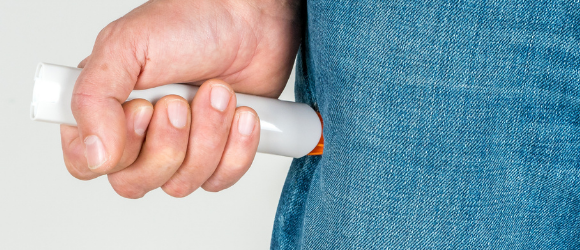Today’s report would not be possible without the continued engagement and support from patients, experts and healthcare professionals. I’d like to thank them for their valuable contribution, time and commitment on this important public health issue. People with life-threatening allergies have the right to the best possible access to AAIs, as well as their use, in the safest and most effective way. They must be protected and these recommendations are designed to do just that, Professor Sir Munir Pirmohamed, Chair of the Commission on Human Medicines
Our advice to those with life-threatening allergies is, make sure you know how to use your adrenaline auto-injector and that you have two with you at all times as a second dose of adrenaline may be needed if symptoms don’t improve after 5 minutes. Your safety is always our priority. That is why, together with the healthcare system, we are implementing the report’s recommendations to improve the safe and effective use of AAIs, and to widen their access where they may be most needed, to help save lives, Dr June Raine, MHRA Chief Executive
It was a privilege to be a member of the Expert Working Group which produced this important report for our allergic community. These recommendations are absolutely fundamental in improving the understanding and use of AAIs – the first line of treatment for someone experiencing anaphylaxis, a condition that can be unpredictable and fatal. These recommendations cover the full spectrum of correct anaphylaxis management, from the importance of early administration of adrenaline and the posture of the patient to timeframes and dose. And they also explore the case for making AAIs available in public spaces, presenting the key considerations for this innovation. Crucially, the report emphasises the importance of understanding how to use the different brands of AAIs, given that a lack of confidence in and understanding of their use could quite simply be a matter of life or death and it reinforces the importance of carrying two AAIs at all times. As the leading charity for people living with allergic disease we welcome this report and its recommendations which we believe will increase safe outcomes for people experiencing anaphylaxis, Carla Jones, CEO of Allergy UK

Life-saving adrenaline auto-injectors could become available in public places
The chance for adults and children suffering from life-threatening allergic reactions to get life-saving shots of adrenaline in public places, such as restaurants and entertainment venues, has come a step closer as a result of a report published today by the government’s independent advisory body, the Commission on Human Medicines (CHM).
A public consultation will be needed before a decision can be made on the wider availability of adrenaline auto injectors (AAIs) in public places, along with legislative change.
Today’s landmark report outlines recommendations for the safe and effective use of AAIs, including quicker treatment, to help save lives. The Medicines and Healthcare products Regulatory Agency (MHRA) is taking forward these recommendations, some of which are already in place.
The recommendations follow the most thorough and rigorous scientific review of the products to date by the MHRA and the CHM’s Adrenaline Auto-injector Expert Working Group, with wide-ranging input from patient groups, leading allergy experts and healthcare professionals to make sure people have the best and latest safety information.

 Helpline
Helpline